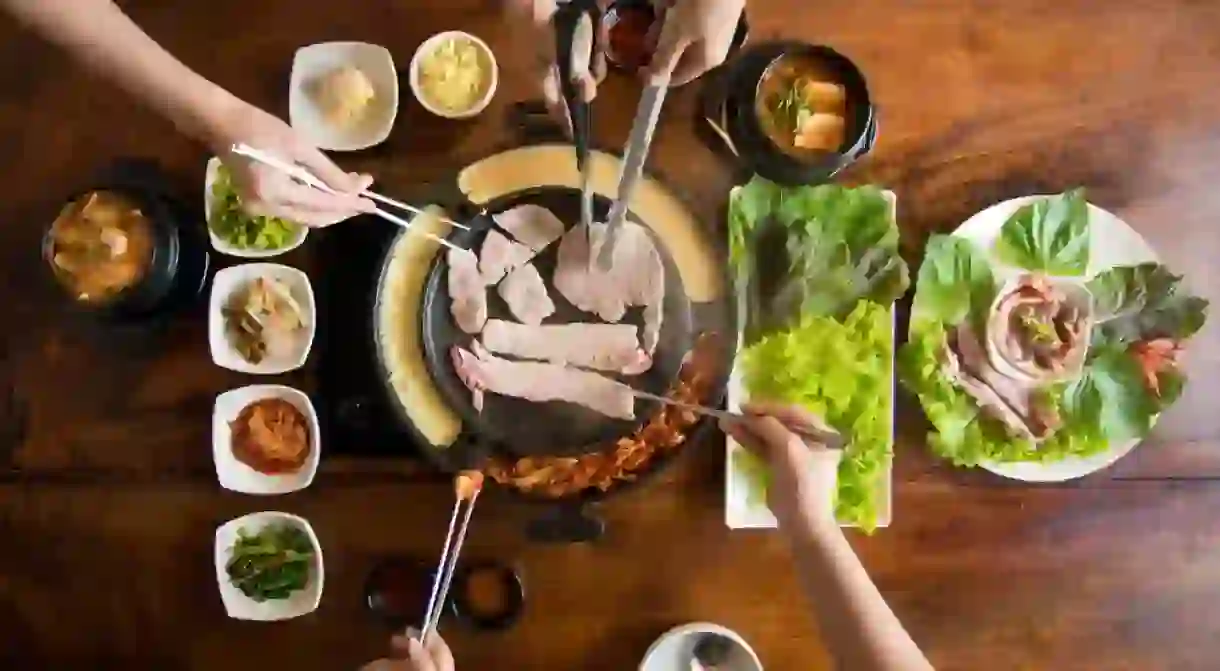A Guide to Korean Table Manners

So you’ve scored a hot date, you’re off to dinner with your workmates, or you’ve been invited for a meal at a friend’s house — whichever it is, you’re going to need a basic knowledge of Korean table manners! Here’s a quick guide to make sure your gastronomic adventures go without a hitch.
Say thank you
Korea is a polite society; be appreciative and it will go a long way. If you feel confident in your Korean, you can say ‘jal meokkessumnida’ (잘 먹겠습니다 ) before the meal — similar to the Japanese itadakimasu, it roughly translates to ‘I will eat well’. After the meal, you can say ‘jal meogeosseumnida’ (잘 먹었습니다) to signal that you have indeed eaten well and are happy.
Respect your elders
This is important, especially in a formal context such as a work dinner, or in a group where some people are significantly older. When you sit down at the table, the youngest (most junior) person should sit at the place closest to the door, and the oldest (or most superior, for example the boss) sits in the spot furthest away. Everyone else sits according to age; inadvertently taking the ‘best spot’ may well cause offence, so be careful. Once the food arrives, the oldest person should start eating first, and everyone else is welcome to follow after this happens; when eating, you should match your speed to those around you (i.e. don’t gobble or eat agonisingly slowly). Once the meal is done, it’s respectful to wait for the oldest person to leave the table first.
Know your utensils
Koreans use a spoon and a set of chopsticks when dining. You should always use utensils (i.e. no fingers!). The spoon is for your rice and soup, and your chopsticks are for everything else — it’s uncouth to use both your spoon and chopsticks at the same time. Your chopsticks can be balanced on the edge of your plate when not in use; they shouldn’t rest on any dish during the meal. They definitely shouldn’t be stuck into your rice bowl, as this is thought to bring bad luck; it looks similar to Korean funeral rites, where sticks of incense are stuck into the ground and burned.

Use crockery correctly
You will have a small plate in front of you. Put all your food on this before you eat it; although it’s tempting, eating directly from communal dishes is seen as rude. Unlike many other Asian countries, your bowl should stay on the table in front of you at all times — it’s much more polite to stoop right over the table, if you have to, than to lift your soup or rice bowl to your mouth.
Don’t spread germs
If you need to cough or sneeze, you should turn away from the table and cover your nose and mouth with a napkin. If you need to blow your nose, you should go to the bathroom (it’s seen as very rude to blow your nose in public). You should keep your mouth closed while chewing — making loud noises won’t be seen as appreciation of the food, but as bad manners.
Your neighbour’s glass should always be full
Although it’s not always observed, making sure your neighbour’s glass stays full is traditionally polite and will get you brownie points with most Koreans. At formal gatherings, this means that your neighbour is also responsible for filling your glass; if you need a top-up, don’t automatically do it yourself, as this will cause your neighbour to lose face. Take your cue from others to see if it’s okay to fill up your own glass, or give your neighbour a nudge by repeatedly filling their glass to capacity. It’s also impolite to refuse drinks (at least the first few), especially if they are offered by someone your senior in age or rank. When you pour drinks, you should always use both hands. If it’s hard to pour with both hands, you can also lightly support your pouring arm by putting your opposite hand under your elbow. Either gesture is perfectly polite.














